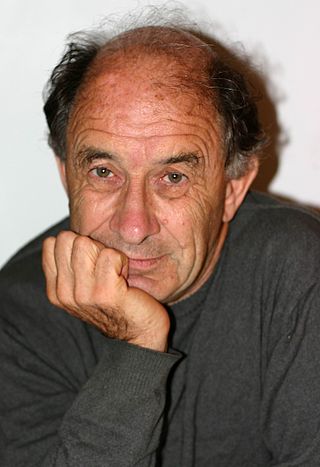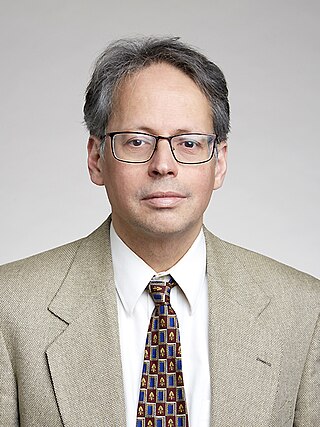
Vladimir Igorevich Arnold was a Soviet and Russian mathematician. While he is known for the Kolmogorov–Arnold–Moser theorem regarding the stability of integrable systems, he contributed to several areas, including geometrical theory of dynamical systems theory, algebra, catastrophe theory, topology, algebraic geometry, symplectic geometry, symplectic topology, differential equations, classical mechanics, differential geometric approach to hydrodynamics, geometric analysis and singularity theory, including posing the ADE classification problem, since his first main result—the solution of Hilbert's thirteenth problem in 1957 at the age of 19. He co-founded two new branches of mathematics—KAM theory, and topological Galois theory.

Geometric group theory is an area in mathematics devoted to the study of finitely generated groups via exploring the connections between algebraic properties of such groups and topological and geometric properties of spaces on which these groups act.
In the mathematical subject of group theory, the rank of a groupG, denoted rank(G), can refer to the smallest cardinality of a generating set for G, that is

John Robert Stallings Jr. was a mathematician known for his seminal contributions to geometric group theory and 3-manifold topology. Stallings was a Professor Emeritus in the Department of Mathematics at the University of California at Berkeley where he had been a faculty member since 1967. He published over 50 papers, predominantly in the areas of geometric group theory and the topology of 3-manifolds. Stallings' most important contributions include a proof, in a 1960 paper, of the Poincaré Conjecture in dimensions greater than six and a proof, in a 1971 paper, of the Stallings theorem about ends of groups.

Zlil Sela is an Israeli mathematician working in the area of geometric group theory. He is a Professor of Mathematics at the Hebrew University of Jerusalem. Sela is known for the solution of the isomorphism problem for torsion-free word-hyperbolic groups and for the solution of the Tarski conjecture about equivalence of first-order theories of finitely generated non-abelian free groups.
Group-based cryptography is a use of groups to construct cryptographic primitives. A group is a very general algebraic object and most cryptographic schemes use groups in some way. In particular Diffie–Hellman key exchange uses finite cyclic groups. So the term group-based cryptography refers mostly to cryptographic protocols that use infinite non-abelian groups such as a braid group.
Generic-case complexity is a subfield of computational complexity theory that studies the complexity of computational problems on "most inputs".
In the mathematical subject of geometric group theory, the Baumslag–Gersten group, also known as the Baumslag group, is a particular one-relator group exhibiting some remarkable properties regarding its finite quotient groups, its Dehn function and the complexity of its word problem.
Olga Kharlampovich is a Russian-Canadian mathematician working in the area of group theory. She is the Mary P. Dolciani Professor of Mathematics at the CUNY Graduate Center and Hunter College.
Lawrence David Guth is a professor of mathematics at the Massachusetts Institute of Technology.

Michael Jeffrey Larsen is an American mathematician, a distinguished professor of mathematics at Indiana University Bloomington.

Alexander Nikolaevich Varchenko is a Soviet and Russian mathematician working in geometry, topology, combinatorics and mathematical physics.
Zhiwei Yun is a Professor of Mathematics at MIT specializing in number theory, algebraic geometry and representation theory, with a particular focus on the Langlands program.

Mark William Gross is an American mathematician, specializing in differential geometry, algebraic geometry, and mirror symmetry.

Paul Eugene Schupp was a professor emeritus of mathematics at the University of Illinois at Urbana Champaign. He is known for his contributions to geometric group theory, computational complexity and the theory of computability.

Kari Kaleva Vilonen is a Finnish mathematician, specializing in geometric representation theory. He is currently a professor at the University of Melbourne.
Albert Marden is an American mathematician, specializing in complex analysis and hyperbolic geometry.

Michael Kapovich is a Russian-American mathematician.
Mark Sapir was a U.S. and Russian mathematician working in geometric group theory, semigroup theory and combinatorial algebra. He was a Centennial Professor of Mathematics in the Department of Mathematics at Vanderbilt University.

Mohammad Sal Moslehian is an Iranian mathematician and a professor of mathematics at Ferdowsi University of Mashhad, Iran. He is the President of the Iranian Mathematical Society for the period of 2021-2024 and an invited member of the Iranian Academy of Sciences. His Erdős number is 3. He is known for his contribution to the operator and norm inequality. He has developed the orthogonality in Hilbert C*-modules and has significant contributions to operator means. He established noncommutative versions of martingale and maximum inequalities that play an essential role in noncommutative probability spaces. In addition, he has written several expository papers discussing research and education, as well as promoting mathematics.











